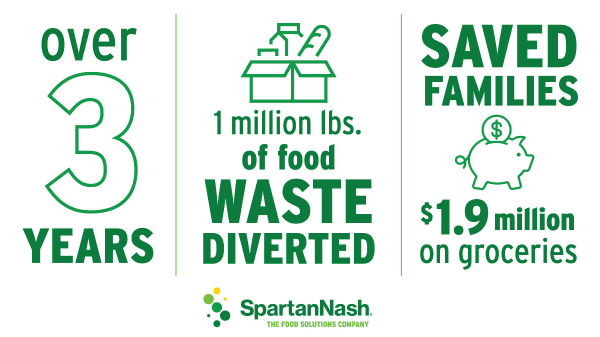SpartanNash recently achieved a significant milestone in its collaboration with technology company Flashfood.
By Richard Smoley
There are apps for everything these days. Including preventing food waste.
In a July 5 press release, the SpartanNash grocery chain BB #:104892 announced that its partnership with the app company Flashfood has diverted over 1 million of food that would have gone to waste, and saving consumers $1.6 million.
The Flashfood app alerts shoppers to products that are nearing their expiry dates, enabling them to purchase the items at a discount. The program was inaugurated in 2020 in Michigan and Indiana through a pilot program with Family Fare and Martin’s Super Markets.
Last year the partnership was extended to 44 Family Fare and VG’s Grocery stores in Iowa, Michigan, and Nebraska. Shoppers make purchases directly through the app and then pick them up at designated “Flashfood Zones” in participating stores.
“At SpartanNash, we’re focused on innovative ways to meet shopper needs,” said SpartanNash Senior vice president and chief marketing officer Amy McClellan. “This solution has made a tremendous difference in preventing food waste while helping families save on imperfect produce and other products that might otherwise end up in landfills.”
In this respect at least, the British are ahead of us. In 2019 a similar app, cleverly called Gander, was introduced in the UK. The company says that it has proved a success in over 500 stores across the nation, saving 25 million food items from going to waste.
On July 6, Gander announced that it was expanding operations to Australia.
Gander has partnered with Spano’s IGA and Country Grocers to bring the app to the states of Queensland and Victoria.
“Typically, retailers have to rely on shoppers sporadically finding a markdown in store while preoccupied with their shopping,” says Gander Australia co-founder Tim Brown. “Therefore, on average, less than half of the food marked down in stores is sold, leaving the rest to become surplus.
“For retailers, reduced food can cost them up to 7% of their turnover. At a time when margins are being squeezed, this is revenue sitting on their shelves that local shoppers would love to buy, they just don’t know it is there.”
Apps aren’t the solution to all the world’s problems. But it seems that they’re at least making a dent in food waste.
By Richard Smoley
There are apps for everything these days. Including preventing food waste.
In a July 5 press release, the SpartanNash grocery chain BB #:104892 announced that its partnership with the app company Flashfood has diverted over 1 million of food that would have gone to waste, and saving consumers $1.6 million.
The Flashfood app alerts shoppers to products that are nearing their expiry dates, enabling them to purchase the items at a discount. The program was inaugurated in 2020 in Michigan and Indiana through a pilot program with Family Fare and Martin’s Super Markets.
Last year the partnership was extended to 44 Family Fare and VG’s Grocery stores in Iowa, Michigan, and Nebraska. Shoppers make purchases directly through the app and then pick them up at designated “Flashfood Zones” in participating stores.
“At SpartanNash, we’re focused on innovative ways to meet shopper needs,” said SpartanNash Senior vice president and chief marketing officer Amy McClellan. “This solution has made a tremendous difference in preventing food waste while helping families save on imperfect produce and other products that might otherwise end up in landfills.”
In this respect at least, the British are ahead of us. In 2019 a similar app, cleverly called Gander, was introduced in the UK. The company says that it has proved a success in over 500 stores across the nation, saving 25 million food items from going to waste.
On July 6, Gander announced that it was expanding operations to Australia.
Gander has partnered with Spano’s IGA and Country Grocers to bring the app to the states of Queensland and Victoria.
“Typically, retailers have to rely on shoppers sporadically finding a markdown in store while preoccupied with their shopping,” says Gander Australia co-founder Tim Brown. “Therefore, on average, less than half of the food marked down in stores is sold, leaving the rest to become surplus.
“For retailers, reduced food can cost them up to 7% of their turnover. At a time when margins are being squeezed, this is revenue sitting on their shelves that local shoppers would love to buy, they just don’t know it is there.”
Apps aren’t the solution to all the world’s problems. But it seems that they’re at least making a dent in food waste.
Richard Smoley, contributing editor for Blue Book Services, Inc., has more than 40 years of experience in magazine writing and editing, and is the former managing editor of California Farmer magazine. A graduate of Harvard and Oxford universities, he has published 13 books.




